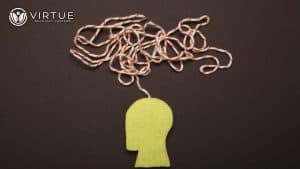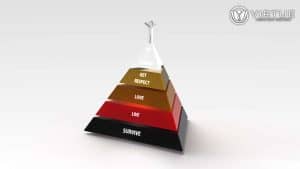The AA 12-Step Program is a cornerstone in the journey to overcome addiction. Developed by Alcoholics Anonymous, this program offers a structured path to recovery through its twelve steps, providing a blend of spiritual, emotional, and practical guidance. This article explores the program’s origins, steps, and significant elements, including the role of meetings, sponsorship, and spirituality, while offering practical advice for those on the path to recovery.
Key Takeaways
- Understanding the AA 12-Step Program – What the 12 steps are and their significance.
- The Role of Meetings – How AA meetings function and their importance.
- Sponsorship in AA – The importance of having a sponsor and what that relationship looks like.
- Spirituality in Recovery – The role of spirituality and the concept of a Higher Power.
- Practical Steps for Recovery – How the 12 steps translate into everyday actions for overcoming addiction.
Introduction
Addiction is a challenging battle that many face, but the AA 12-Step Program offers a structured path to recovery. At Virtue Recovery Chandler, we understand the struggles and are here to support you or your loved one on this journey. This article delves into the 12-Step Program, highlighting its significance, processes, and benefits for those dealing with addiction.
Understanding the AA 12-Step Program
History and Origins
The AA 12-Step Program was created in 1935 by Bill Wilson and Dr. Bob Smith as a way to help individuals struggling with alcoholism. The program has since expanded to address various types of addiction. It all started when Bill W., as he was known, found that sharing his experiences and supporting others in their recovery was a powerful tool for maintaining his own sobriety. This mutual aid approach quickly evolved into a formal program with defined steps.
Overview of the 12 Steps
Each of the 12 steps provides personal recovery and growth guidelines, focusing on acceptance, surrender, and active change. The steps begin with admitting powerlessness over addiction and end with carrying the message of recovery to others. These steps are designed to help individuals achieve and maintain sobriety, foster personal growth, and improve their quality of life.
The Role of Meetings
Types of Meetings
AA meetings come in various formats, including open and closed meetings, speaker meetings, and discussion meetings. These gatherings provide a supportive environment for sharing experiences and gaining insights. Open meetings are accessible to anyone interested in learning about AA, while closed meetings are restricted to those who identify as having a drinking problem. Speaker meetings feature one or more members who share their personal stories of recovery, and discussion meetings allow for group discussions on various recovery-related topics.
Benefits of Meetings
Regular attendance at AA meetings helps maintain sobriety through mutual support and accountability, fostering a sense of community and belonging. Meetings provide a safe space to share struggles and successes, learn from others, and receive encouragement. Group members’ camaraderie and shared experiences can be incredibly motivating and reassuring.
Sponsorship in AA
What is a Sponsor?
A sponsor is a more experienced member of AA who provides guidance and support to newcomers. They help them navigate the 12 steps and offer a personal connection in their recovery journey. Sponsors share their experiences and offer practical advice, helping sponsees stay focused and motivated.
Choosing a Sponsor
Finding the right sponsor involves looking for someone with experience, a compatible personality, and the ability to provide the necessary support and accountability. Choosing someone trustworthy, who has a stable recovery, and who can commit the time needed to help guide you through the steps is important. A good sponsor will challenge you to grow while offering empathy and understanding.

Spirituality in Recovery
Concept of a Higher Power
Spirituality is a key component of the 12-Step Program, emphasizing the belief in a Higher Power. This flexible concept allows individuals to define it in a way that aligns with their personal beliefs. The idea is not to enforce a specific religious viewpoint but to encourage a sense of connection to something greater than oneself, which can provide comfort and strength during recovery.
Personalizing Spirituality
Individuals are encouraged to adapt the idea of a Higher Power to fit their own understanding and experiences, making the spiritual aspect of the program accessible to everyone. This could mean a traditional religious figure, the power of the group, or the inner strength found within oneself. The key is finding a source of support and guidance that resonates personally.
Practical Steps for Recovery
Applying the Steps
The 12 steps provide a practical framework for recovery, guiding individuals through a process of self-examination, acceptance, and active change. This involves admitting powerlessness over addiction, making amends, and continuing personal growth. Working the steps often includes writing down reflections, discussing them with a sponsor, and taking concrete actions to address past behaviors and build a healthier future.
Making Amends
Making amends is a critical step that involves acknowledging the harm caused and taking steps to repair relationships. This process helps heal and rebuild trust. It’s about more than just saying sorry; it’s about making meaningful changes and demonstrating commitment to those changes. This can be a powerful way to clear the past and pave the way for a brighter future.
Conclusion
The AA 12-Step Program is a powerful tool for overcoming addiction, offering a structured and supportive approach to recovery. At Virtue Recovery Chandler, we are dedicated to helping individuals and families navigate this journey. If you or a loved one is struggling with addiction, give us a call at 866-338-5779 for support and guidance.
FAQs
What is the success rate of the AA 12-Step Program?
Success rates can vary, but many find lasting recovery through the program, especially when actively participating in meetings and working with a sponsor.
Can the 12 steps be applied to other addictions besides alcohol?
Yes, the 12 steps have been adapted for various forms of addiction, including narcotics, gambling, and more.
How long does it take to complete the 12 steps?
The timeline can vary widely depending on the individual. Some may work through the steps in a few months, while others may take years.
Is it necessary to believe in God to participate in AA?
No, the concept of a Higher Power is flexible and can be interpreted to fit personal beliefs, whether religious or secular.
Is the 12-step program effective in treating alcohol addiction?
The 12-step program is widely regarded as an effective treatment approach for alcohol addiction. This framework, developed by Alcoholics Anonymous (AA), helps many people achieve and maintain sobriety by providing a supportive community and a structured path toward recovery. Studies and personal testimonies suggest that the combination of peer support and spiritual growth within 12-step groups significantly aids individuals battling alcohol use disorder.
What is the 12-Step AA Program?
The 12-Step AA Program is a treatment program aimed at helping individuals overcome addiction, particularly alcoholism. It was founded by Alcoholics Anonymous and is based on the principle that individuals can help one another achieve and maintain abstinence. The steps involve admitting powerlessness over alcohol, recognizing a higher power, making amends for harm done, and carrying on the message to others suffering from alcohol addiction.
What are the 12 steps of AA?
The 12 steps of AA are designed to foster recovery from alcoholism and include admitting powerlessness over alcohol, believing that a higher power can restore sanity, and making a decision to turn our will and lives over to the care of this higher power. Other steps involve making a moral inventory, admitting wrongs, being ready to have these defects of character removed, and making amends to those harmed. The final steps focus on continuing personal inventory, seeking through prayer and meditation to improve contact with the higher power, and carrying the message of recovery to other alcoholics.
What are some variations of the 12-Steps of AA?
Variations of the 12-Step program have been adapted to address a wide range of substance use and behavioral health disorders beyond alcoholism, including Narcotics Anonymous for drug addiction and other groups for gambling, sex addiction, and eating disorders. These variations maintain the core principles of admitting powerlessness over addiction, seeking help from a higher power, making amends, and helping others. Despite the different focus areas, all maintain the spiritual framework and peer support system fundamental to the original 12-step program, emphasizing recovery support and fellowship among members.
What is the basic concept of a 12-step program?
The basic concept of a 12-step program is to help individuals overcome addiction and maintain sobriety through a structured set of spiritual and practical steps. These programs, including Alcoholics Anonymous (AA) and Narcotics Anonymous (NA), emphasize the importance of admitting powerlessness over the addiction, finding hope in a higher power, making amends for past harms, and helping others with similar addictions. The 12-step approach combines peer support, sponsorship, personal accountability, and spiritual growth to treat substance use disorders and behavioral health issues effectively.
What is the purpose of the step 12?
The purpose of Step 12 in the 12-step program is to culminate the spiritual development achieved through the previous steps. It encourages members to practice these principles in all their affairs and to carry the message of recovery to other addicts. Step 12 is vital for ensuring the sustainability of personal recovery by emphasizing service to others and sharing the healing message of the 12-step program with those still suffering from substance abuse.
What does Step 12 mean in AA?
In Alcoholics Anonymous, Step 12 states: “Having had a spiritual awakening as the result of these steps, we tried to carry this message to alcoholics and to practice these principles in all our affairs.” This step means that members who have experienced a change through the earlier steps are encouraged to share that experience with others struggling with alcohol addiction and to apply the learned spiritual principles in every aspect of their lives. It highlights the importance of giving back and supporting others to reinforce one’s recovery.
Are 12-step programs free?
Yes, 12-step programs are free to attend. They are supported by voluntary contributions from members and designed to be accessible to everyone regardless of their financial situation. The primary focus is on providing a supportive community and a path to recovery for individuals struggling with addiction, making these programs an invaluable resource for many.
Is there a 12-step program for grief?
Yes, there are 12-step programs designed specifically for managing grief, such as GriefShare. These programs adapt the traditional 12-step framework to help individuals cope with losing a loved one, offering a structured approach to healing that includes sharing experiences, finding peer support, and using spiritual principles to find comfort and resolution.
Are 12-step programs effective for opioid addiction?
12-step programs are effective for many individuals struggling with opioid addiction. Programs like Narcotics Anonymous provide support and a framework for recovery based on the successful model developed by Alcoholics Anonymous. The emphasis on peer support, spiritual growth, and personal accountability helps many achieve and maintain sobriety. However, outcomes can vary depending on individual engagement and the presence of additional treatments like medication-assisted therapy.
Who created the 12-step program?
The 12-step program was created by Bill Wilson and Dr. Bob Smith, the founders of Alcoholics Anonymous, in 1935. Their pioneering work led to the development of a program that has since been adapted to help millions of people around the world overcome alcoholism as well as various other forms of addiction and behavioral issues, promoting a legacy of recovery and support through community-based fellowship.
What resources are available for those who need additional support?
In addition to AA meetings and sponsorship, many find support through counseling, therapy, and other recovery programs. Virtue Recovery Chandler offers comprehensive support for those in need.
Resources
https://www.aa.org/the-twelve-steps
https://www.ncbi.nlm.nih.gov/pmc/articles/PMC3753023/
https://portal.ct.gov/dmhas/initiatives/evidence-based/12-step-facilitation








